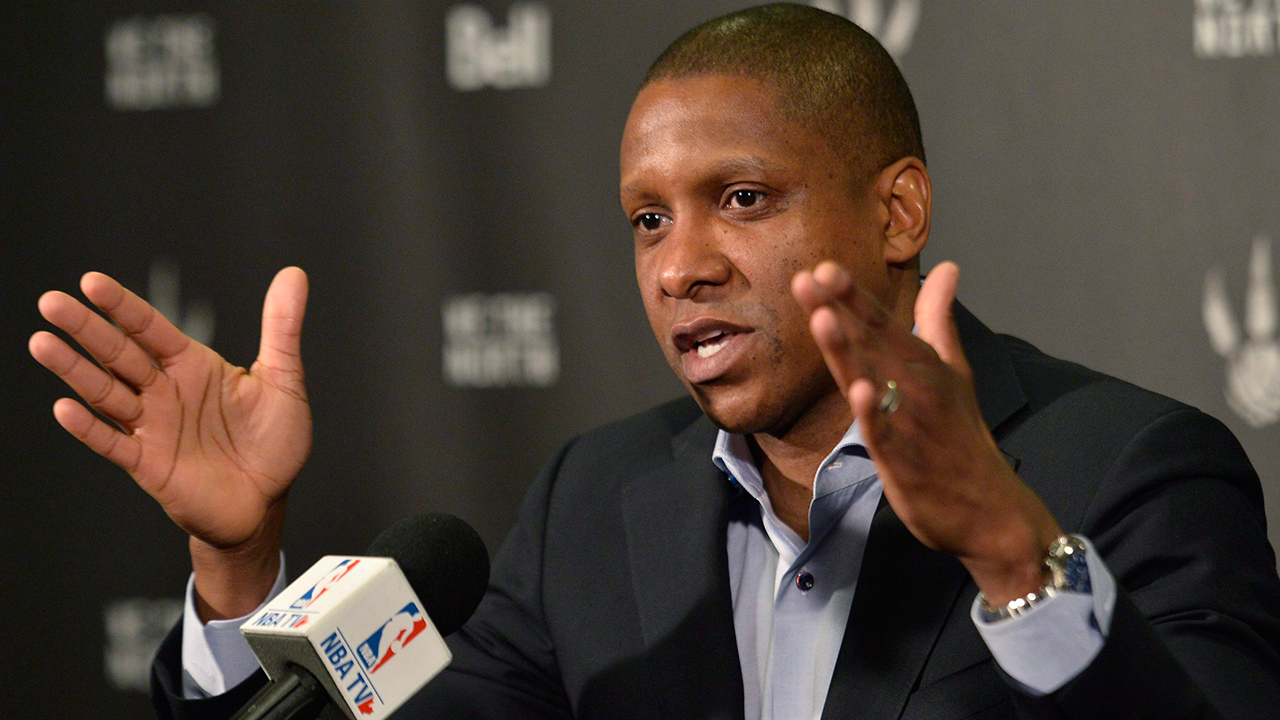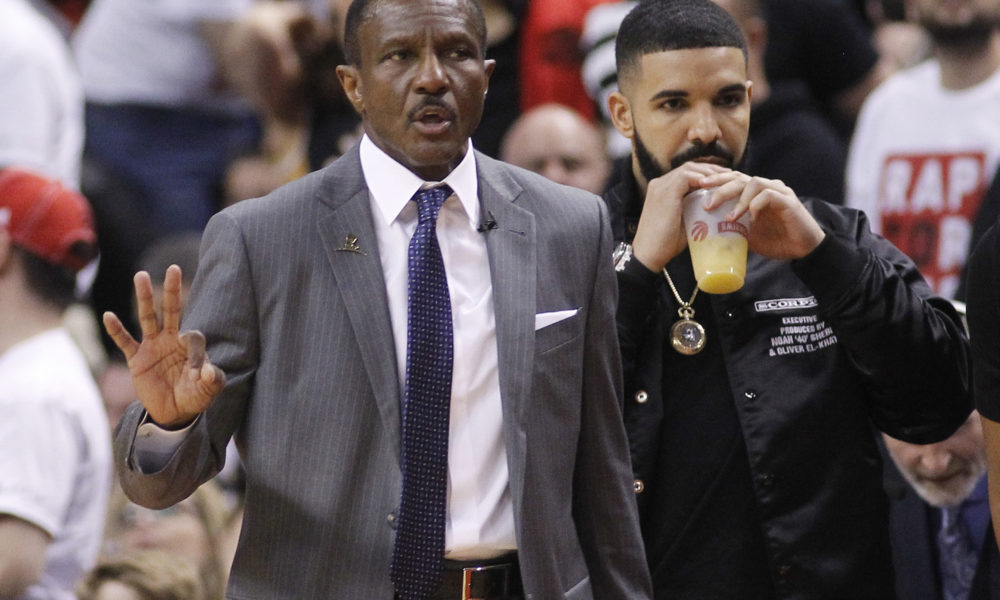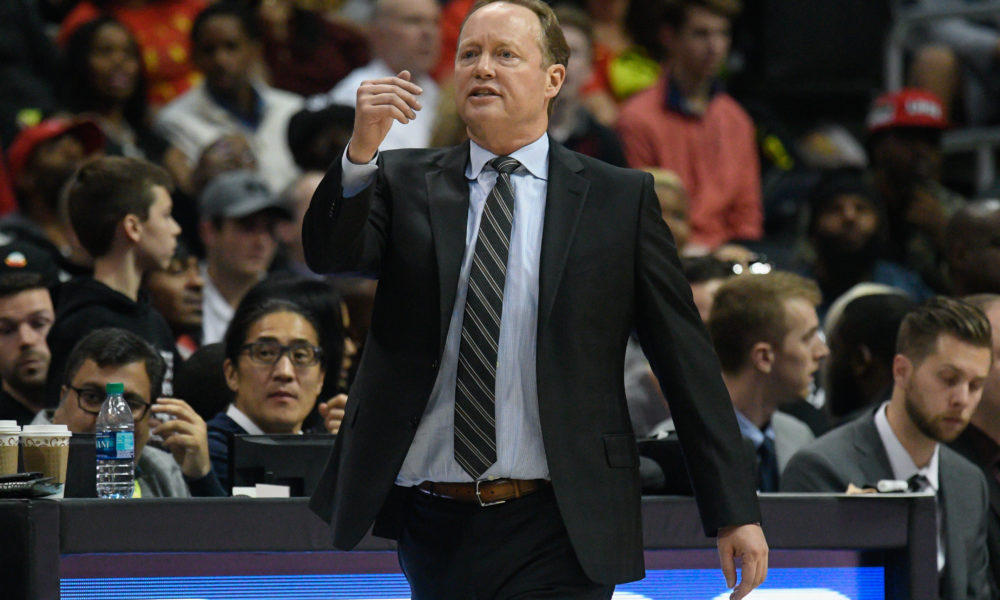It’s true, the hardest thing and the right thing to do can often be one and the same. In order to gain, something must be sacrificed. The decision to be made can be complicated by relationships on the line, a fear of success or failure, or even change alone. Coming through any of that to actually do the right thing involves confronting truths that were kept aside to stay in the safe zone.
Ever since Raptors President Masai Ujiri gave Dwane Casey a vote of confidence, they have worked together to build a franchise the city of Toronto and country of Canada can be proud of. They’ve steadily worked their way up to 59 wins and the second-best record in the league this season, from the worst defense in the league to one that ranks in the top five. Some may patronize the Raptors for their regular season success, but it wouldn’t be a stretch to say that roughly two-thirds of the league would trade places with them in a heartbeat. That’s a far cry from where this franchise was before the pair established themselves as pillars of this team and mustn’t go unnoticed.
The Raptors are in the fast lane now, though, and so Ujiri fired the team’s coach of seven years this past Friday because he believes there is a higher ceiling to be achieved. Realistically, it may not be quite the roof that the Cleveland Cavaliers and Golden State Warriors have done battle for over the past three seasons and quite possibly this year again, but after believing enough in its present core in the 2017 offseason to give them a three-year run — and see them kick it off by finishing with the top seed in the Eastern Conference — it’s easy to comprehend why they feel the need to explore the true depths of it.
Barring the Cleveland series, Kyle Lowry adjusted well to his new role as a secondary ball-handler, DeMar DeRozan became a more efficient scorer while leveling up his playmaking, Jonas Valanciunas re-entered relevancy, and the youth delivered in spades. That’s the good news. The bad news is that for all the offensive and defensive changes, they still turned out to be the “same old Raptors” when their truest test came against the Cavaliers.
Similar defensive strategies led to déjà vu defensive lapses, a lack of poise in swing moments led to series swinging losses, and perhaps most frustrating of all, the admission that they failed to recognize soon enough just how physical they needed to be resulted in the meek surrenders that occurred in Games 2 and 4.
Casey’s dismissal is the admission of a truth that has lingered for some time.
When he made his way over to Tyronn Lue to congratulate him on another series victory, Casey looked a man who knew his fate. His lips moved every which way, but it was his body language that did the talking. He said his team was “emotionally drunk” after, but also admitted that he thought his players would show more fight. He lost them, and ultimately, his job.
Ujiri’s decision to fire Casey stands as a pivotal moment for this franchise, but not one borne out of the emotion and frustration of just the Raptors’ final four games. Rather, like the pressure cooker that the playoffs are, the sweep at the hands of the Cavaliers marked the final boiling point during which any remaining patience had evaporated.
There was the play that was drawn up on the wrong side of the floor in Game 7 against Brooklyn in 2014, the inability to offer any kind of sustainable answer to Washington going small with Paul Pierce at the 4 in 2015, the struggle to get past Indiana in the first round in 2016, and then the beatdown at the hands of the Bucks in Game 3. It’s quite possible that Game 4 against the Wizards this year also left a bit of a mark. Sportsnet’s Michael Grange detailed the frustrations of the most recent sweep at the hands of the Cavs so there’s no need for me to delve much deeper there.
It has been a history of slow reactions from the coaching staff in the playoffs, causing their team to repeatedly play uphill and race against time before the clock hits four. But, looking to the top, should the front office have been quicker to recognize this? Why have they been just as slow?
If the culture reset was indeed a top-down directive, did it really need a second sweep and another injury to Lowry to push for it? Toronto finally coming to terms with what a modern offense looks like arrives at a time when Golden State has begun embracing the midrange once again. The impact of a significant load on Lowry during the regular season in the playoffs was evident in 2015, so then why did it take two more years to recognize the need to rest him?
Grange also reported that “there have been frustrations internally that DeRozan wasn’t held accountable enough for his defensive lapses.” Where is the transparency that allows for this internal front office itch to translate into real conversation and change? Would DeRozan then have been consistently benched in fourth quarters just as Valanciunas has been?
One of the plausible answers to a lot of this is that the macro, rightfully, I think, mattered too much for the micro to be a pressing issue. Toronto was establishing and continues to establish the reputation of a winner, and now boasts a world-class organization which players and executives alike admire. That can easily be forgotten so far removed from the doldrums of being an Eastern Conference cellar-dweller, but there is a freshness in the air to the way this franchise treats all its employees that now makes it an attractive location. With all due respect to other franchises’ upkeep, the Raptors aren’t in a situation where they can dangle a generational talent like Giannis Antetokounmpo or Kristaps Porzingis as bait. They can’t be Los Angeles and they can’t offer tax situations like Texas and Florida. Ujiri and Casey have made this franchise — LeBronto jokes aside — a respectable one by building on something that can outlast names and market-driven selling points.
“We’ll come and go, Casey will come and go, I will come and go, Kyle Lowry will come and go, Toronto is not going anywhere,” Masai said at his end-of-season presser. “Toronto basketball will be here for 100 years and it will stay here.”
Perhaps, this is why we saw Ujiri arguably be his most passionate and forceful self during that press conference. Because the NBA world chose to react to the sweep without any real acknowledgement of what Toronto had achieved in getting to this point: the top seed, one shy of 60, five straight playoff appearances after just five total in the previous 18 years of existence.
And that may be why Ujiri has made it clear with Friday’s move that he is emphasizing the micro now. It’s apparent the structure to maintain the big picture of a successful NBA franchise has been established, and now is the time to determine how best to swing for the fences. Will he re-evaluate how he builds teams as a result of now having two franchises on his resume with whom he has experienced greater regular season success than postseason?
The co-franchise players can’t be left out of this either. There is one quote by former general manager Jeff Weltman that has stuck with me for some time now. “I really look at the Raptors today as having entered a post-ego phase of their development — which is a goal that many teams have,” he said in an interview with Sportsnet’s Dave Zarum.
“What I mean by that is you have to go through the growing pains of young players who want to make all-star games, and who have contract extensions coming up, and all of those things that are obstacles to bringing a team together.”
Did those things really need to come first for Lowry and DeRozan or was that the backdrop upon which the franchise needed to establish respectability? Toronto’s slow progress is evident here as well, with DeRozan especially. He has built himself through hard work into the player he is today, but the lack of a three-point shot in today’s NBA sticks out like a sore thumb with his level of usage. So does the lack of attention detail on the defensive end, possibly sacrificed because of all the work he’s put in to become a lethal scorer. Hard work beats talent when talent doesn’t work hard. They aren’t the most talented duo, and so when they come across guys who work just as hard and have talent to boot, they fall well short.
What they have accomplished goes together with much needed selling points for the franchise. Two multiple time all-stars, two guys who didn’t have a real attachment to the city going on to re-sign twice, and building a chemistry that has clearly percolated through the rest of the roster. There are so many false truths of the past that needed to be eradicated just to create a clean slate for the Raptors to build off of: stars can stay and have long, successful careers in Toronto. This is indeed a city that’s worth the cold and delays at customs. Canada isn’t just a hockey country.
It’s easy to lose sight of these things from a micro vantage point, but that wasn’t the measure for the past five years. “We went through a lot of different phases in Toronto,” Weltman said in the same interview. “We started out not knowing which direction we were going to take the team and arrived in a place where we were comfortable just building on the roster and figuring out ways to implement winning habits and continuity.”
As the goalposts change, the parameters by which success was being measured in the past shouldn’t be forgotten. They’re in a good place and, now, failure can either be the driving force towards greater success or a crippling blow that makes one settle for familiarity and mediocrity.
The desire for a new coach shows they have no appetite for the latter, but with a change of focus, the front office should also accept that it isn’t the only change that’s necessary. There are weaknesses all the way through from top to bottom with this franchise in terms of being a true championship contender, and how many truths they feel they need to address in the coming two seasons will say a lot about who they want to be going forward.




